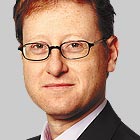 “It’s a crude reaction but it’s the first one I had on hearing that the Swiss had voted to ban the building of minarets on mosques – the same reaction I have to the increasingly-frequent stories like it: how would I feel if this were not about them, but us? How, in other words, would I react if this latest attack were not on Muslims but on Jews?
“It’s a crude reaction but it’s the first one I had on hearing that the Swiss had voted to ban the building of minarets on mosques – the same reaction I have to the increasingly-frequent stories like it: how would I feel if this were not about them, but us? How, in other words, would I react if this latest attack were not on Muslims but on Jews?
“It’s crude because no two situations are ever exactly the same, and Muslims and Jews have different histories – in Switzerland and everywhere else. But it’s useful, allowing the testing of any proposition against an almost instinctive yardstick of decency.
“So how would I react if the Swiss voted to restrict the way synagogues are built? With horror, of course. Indeed, the mere hint of such a proposal in the heart of Europe – given the blood-soaked history of the 20th century – would send a shudder down the collective spine. That reaction alone would tell me that, on this proposal, there was only one decent place to be – against it.
“Or take Jack Straw’s campaign against the niqab in 2006. He and his supporters made what they hoped was a subtle, nuanced case against women wearing the full veil, but my first thought was much simpler. What if a government minister told ultra-orthodox Jewish men that, in their full beards, it was hard to tell them apart, or that he disliked the custom that commands ultra-orthodox Jewish women to cut off their hair, covering their heads with either a wig or a hat? No matter how subtle or nuanced his reasons, I would feel that this was, at best, an act of bullying directed at a vulnerable minority or, at worst, the first step towards something much more menacing.”
Jonathan Freedland at Comment is Free, 1 December 2009

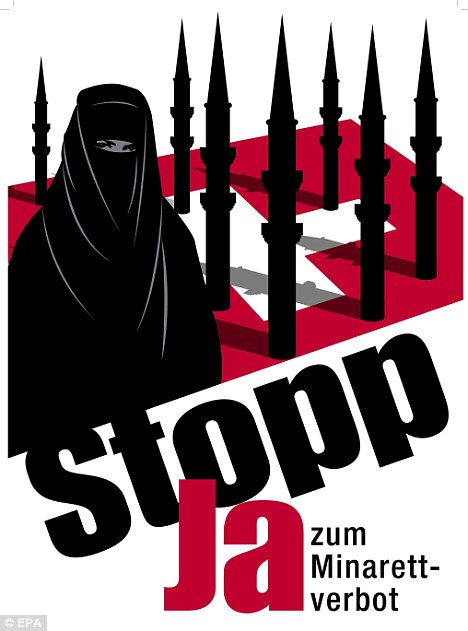 “Over the last two decades Islam has become connected to so many controversial debates – violence, extremism, freedom of speech, gender discrimination, forced marriage, to name a few – it is difficult for ordinary citizens to embrace this new Muslim presence as a positive factor. There is a great deal of fear and a palpable mistrust. Who are they? What do they want? And the questions are charged with further suspicion as the idea of Islam being an expansionist religion is intoned. Do these people want to Islamise our country?
“Over the last two decades Islam has become connected to so many controversial debates – violence, extremism, freedom of speech, gender discrimination, forced marriage, to name a few – it is difficult for ordinary citizens to embrace this new Muslim presence as a positive factor. There is a great deal of fear and a palpable mistrust. Who are they? What do they want? And the questions are charged with further suspicion as the idea of Islam being an expansionist religion is intoned. Do these people want to Islamise our country?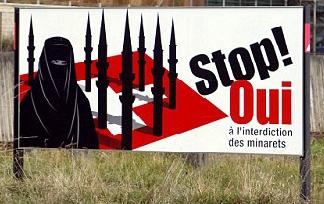 A right-wing campaign to outlaw minarets on mosques in a referendum being held in Switzerland today has received an unlikely boost from radical feminists arguing that the tower-like structures are “male power symbols” and reminders of Islam’s oppression of women.
A right-wing campaign to outlaw minarets on mosques in a referendum being held in Switzerland today has received an unlikely boost from radical feminists arguing that the tower-like structures are “male power symbols” and reminders of Islam’s oppression of women.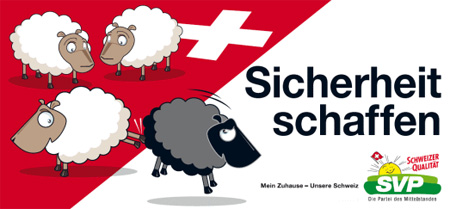 Swiss voters defied their Government and churches today and approved a ban on building minarets — reflecting an alarming hostility to a rising Muslim minority.
Swiss voters defied their Government and churches today and approved a ban on building minarets — reflecting an alarming hostility to a rising Muslim minority.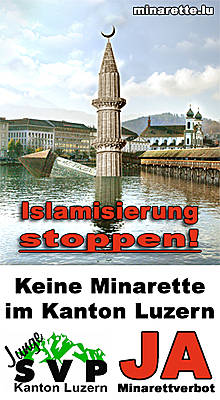 In Switzerland, home of the referendum, voters decide on everything from reducing fighter jet noise in tourist areas to boosting funding for complementary medicine. Although generally of narrow interest, even at home, once in a while, a plebiscite comes up that stirs passions well beyond national borders. That will be the case on Sunday, when voters decide on a call to ban construction of minarets at mosques.
In Switzerland, home of the referendum, voters decide on everything from reducing fighter jet noise in tourist areas to boosting funding for complementary medicine. Although generally of narrow interest, even at home, once in a while, a plebiscite comes up that stirs passions well beyond national borders. That will be the case on Sunday, when voters decide on a call to ban construction of minarets at mosques. The normally sleepy Swiss country town of Langenthal has become the focus of a virulent right-wing campaign to ban minarets from all mosques in the Alpine republic on the grounds that they symbolise ideological opposition to the country’s constitution.
The normally sleepy Swiss country town of Langenthal has become the focus of a virulent right-wing campaign to ban minarets from all mosques in the Alpine republic on the grounds that they symbolise ideological opposition to the country’s constitution.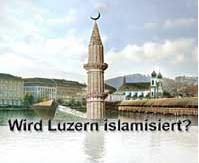 “An overwhelming rejection of the ‘minaret initiative’ would serve as encouragement to all Muslims in Switzerland.
“An overwhelming rejection of the ‘minaret initiative’ would serve as encouragement to all Muslims in Switzerland.